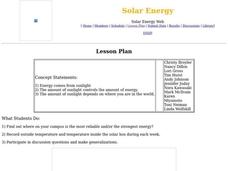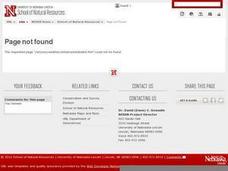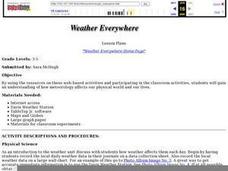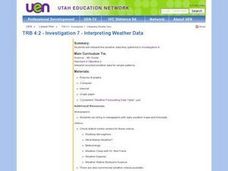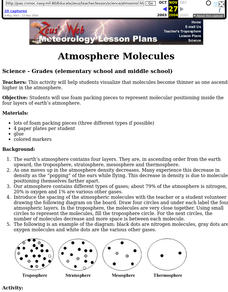Curated OER
Fahrenheit vs Celsius
Students construct a thermometer and convert Fahrenheit temperature into Celsius temperature. In small groups, they construct a thermometer, write a paragraph describing how to make a thermometer, and convert temperatures.
Curated OER
Believe It...Or Not
Students critically analyze data regarding climate changes using a glossary of terms generated by examination of climate related articles. They examine and graph climatic data, and discuss, hypothesize and test apparent discrepancies in...
Curated OER
Solar Energy
Young scholars find out where on campus is the most reliable and/or the strongest energy, record outside temperature and temperature inside the solar box during each week, and participate in discussion questions and make generalizations.
Curated OER
Investigation 8 - Weather Forecasts
Fourth graders examine how to predict and evaluate weather forecasts. Discuss with students why weather predictions are important to us. Ask them what people do after they hear a forecast. They brainstorm reasons forecasts are important...
Curated OER
How Clouds And Fog Are Formed
Students define what a cloud is and what fog is. After a lecture/demo, students participate in an experiment on how clouds and fog are formed. In pairs, they perform the experiment a second time, record their results and present to the...
Curated OER
Thunderstorm Outflow
Pupils list at least three physical characteristics of a thunderstorm outflow. They explain what physical process occurs in a thunderstorm to create the storm's outflow, and locate the thunderstorm's outflow.
Curated OER
Ancient Sun Models of the World
Students explain that many different cultures across the world developed their own reasoning for the weather around them. They explore the different cultural beliefs of the sun's cycle and to create their own story of the sun's movement.
Curated OER
Aspects of Weather
Students recognize and observe weather phenomena. In this four part weather instructional activity, students are introduced to weather symbols through a story, then use a thermometer to measure water temperature. Next, students observe...
Curated OER
Branches of Science
In this branches of science worksheet, students are given one page of pictures related to four branches of science. These include astronomy, meteorology, oceanography and geology.
Curated OER
Meteorology Word Search Puzzle
In this science worksheet, students look for the words that are related to the theme of the worksheet. They also work on the skills of spelling and word recognition.
Curated OER
Branches of Science
In this science learning exercise, students locate and identify the various branches of science as they are named. There are 36 words/phrases located in the puzzle.
Curated OER
Weather Watchers
Students engage in this weather predicting lesson. They discover instrumentation used in the meteorological science. With this knowledge, they will create their own "low-tech" versions of weather instrumentation such as thermometers,...
Curated OER
Understanding Cloud Formation
Students read and relate the poem, "Clouds" by Aileen Fisher to a demonstration on cloud formation. They create clouds in jars using ice water and matches then discuss the ways clouds can be used to predict weather.
Curated OER
Get on the Hurricane Track...Prepare Yourself!
Students research hurricanes. Students explore the stages of hurricanes, the Weather Forecasting Center, and tracking of hurricanes. They analyze information and produce a public service announcement educating the public on hurricane...
Curated OER
Activities to Enhance STEDII Data
Students develop an understanding of related weather processes such as wind, cloud cover, and temperature using STEDII data and instrumentation. In addition, they integrate mathematical calculations to produce a forecast map.
Curated OER
Weather Variables Lab
Pupils examine what happens when air temperature drops and gets closer to the dewpoint. They perform a lab activity which illustrates the effects on humidity, precipitation and barometric air pressure.
Curated OER
Meteorologist for a Day
Students research weather patterns, predict the weather for a US city and write a weather forecast that be presented to the class. The forecast should explain their weather prediction and the weather patterns and conditions it is based on.
Curated OER
CYCLONES EXPLAINED
Students examine how tropical cyclones form and behave. They answer a variety of questions after examining specific pictures and figures regarding cyclones.
Curated OER
Weather Everywhere
Students gain an understanding of how meteorology affects our physical world and our lives. They utilize resources on web-based activities and participate in the classroom activities to enrich their understanding.
Curated OER
Investigation 7 - Interpreting Weather Data
Fourth graders interpret the weather data they gathered in Investigation 6. They take an average of each component in each season. They compare the same components of each season and write the differences they see between the seasons.
Curated OER
Cold Front Characteristics
Learners study the weather conditions before, during, and after cold front passage. Two cold front examples are provided so that comparisons can be made. They are divided in two large groups. Each group studies a different cold front case.
Curated OER
Atmosphere Molecules
Students use foam packing pieces to represent molecular positioning inside the four layers of earth's atmosphere. This lesson help students visualize that molecules become thinner as one ascends higher in the atmosphere.
Curated OER
Condensation
Learners explain how water changes from vapor to liquid with a change in temperature by engaging in this experiment. They use a worksheet imbedded in this lesson to guide their inquiry.




